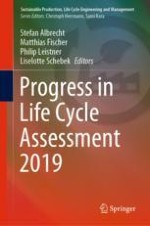2021 | OriginalPaper | Buchkapitel
12. Pros and Cons of Batteries in Green Energy Supply of Residential Districts — A Life Cycle Analysis
verfasst von : Steffen Lewerenz
Erschienen in: Progress in Life Cycle Assessment 2019
Aktivieren Sie unsere intelligente Suche, um passende Fachinhalte oder Patente zu finden.
Wählen Sie Textabschnitte aus um mit Künstlicher Intelligenz passenden Patente zu finden. powered by
Markieren Sie Textabschnitte, um KI-gestützt weitere passende Inhalte zu finden. powered by
